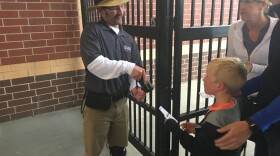The tragic consequences of Michigan’s new auto no fault law continue to mount.
Republican leaders in the state legislature promised to fix known problems with the law after it was passed.
But they haven’t.
More than 18,000 catastrophically injured Michiganders are losing necessary medical care as a result.
On Sunday, Kelley Miller, a survivor of a catastrophic car crash, lost her home care. Miller needs 24/7 care to survive. She is a quadriplegic, paralyzed from the shoulders down.
The nurse who has been with her the longest, Shara Curry, is also the co-owner of RN Plus Staffing, the agency that provided her care. Tears suddenly welled up in her eyes as she called the 911 operator and explained why Miller needs an ambulance to take her to Sparrow Hospital.
Curry has been caring for Miller for ten years, ever since the car accident that nearly claimed her client’s life. Miller isn’t just a client, she’s a friend.
Miller’s insurance company, Auto - Owners, has cut reimbursements to Curry’s agency by nearly half. Michigan's new no fault law says it can do that. Many insurance companies across the state are doing the same thing to other survivors’ agencies. Like them, Curry can no longer afford to pay her staff, let alone herself. And there’s no place to send her client except the hospital.
Miller lay quietly on the bed as another nurse from the agency put her makeup on for her. For ten years, Miller has lived in this rural home north of Lansing with her husband — played word games and board games with her grandchildren — bossed her family around. She filled the house with knick-knacks from garage sales and flea markets. Outside, she has chickens, some cows. It was a good life, she said.
"My granddaughter's birthday party was today at Skateland," she said, and then began to cry. "It's something I looked forward to. But … I won’t be there."
It’s likely Miller will never come home from the hospital. Other agencies are running out of money and closing, too. If Miller can't return to her home, the hospital will need to find a nursing facility that will agree to take her. Many are severely understaffed.
"I can’t even imagine what it would be like, there’s no quality of life, you’re just done," Miller said of the possibility of living in an institution. "I would be (done) anyway. I wouldn’t want to live anymore."

Miller would die in minutes if her ventilator didn't work. If she did move to a nursing home, Shara Curry said her prospects there are grim. The tubing connecting her to her ventilator comes loose on a regular basis.
"We save her life at least twice a month. In a nursing home, she can’t move, she can’t press a call light. How would she let them know that she was in trouble?" Curry asked.
Shortly after the 911 call, first responders from the local fire department arrived. They took her vitals. Then the paramedics from the ambulance service arrived. They pushed into the small bedroom with a stretcher.
It’s not easy to safely move someone with such a severe spinal cord injury. There was one scary moment during the transfer when it seemed like the ventilator tubing had come off. The ventilator started beeping madly, then just as quickly stopped.
Her husband Bud reached out to touch her forehead as he said goodbye. She was scared.
"I will follow you, honey. It's all right. We'll make it," he said.
Then she was out of the house, loaded quickly into the ambulance, and gone — on the way to a hospital room in Lansing.
Bud Miller was distraught. He said he knew the hospital was not the safest place for Kelley. But he’d run out of options.
"If she was to get COVID, she’ll never pull through it, never," he said, "and I think that’s honestly what Auto-Owners wants. We've been together 45 years, and it’s just killing us, how the laws can just do what they want to destroy people."
In a few minutes, he drove away to catch up with the ambulance, so he could be at the hospital when his wife arrived at the E.R.

Kathleen Lopilato is an attorney for Auto Owners insurance. She said an in email the company continued paying Kelley Miller’s coverage at old rates for months so Miller could find another home care agency to take care of her.
But the Millers could not find one with so many agencies shutting down.
Lopilato also said the Michigan Catastrophic Claims Association, which controls payments for high needs cases like Miller’s, wouldn’t approve higher rates or another extension.
The Claims Association has a surplus, made even larger recently because it is no longer paying agencies the old rates for care for people like Kelley Miller. Governor Gretchen Whitmer has asked the Claims Association to send some of that surplus in a one time payment to current car owners this spring.
Nurse Shara Curry calls it blood money, to deflect attention from the cruelty of the no fault law, and obscure the fact that Michigan is still in the top three most costly in the nation for auto insurance.
Meanwhile, many advocates for auto accident survivors are busy this week calling and emailing their state legislators. They’re urging them to co-sponsor a new bill to increase rates for care providers for car crash survivors. The bill is about to be introduced in the House by Republican State Representative Phil Green. Green hopes if there are enough co-sponsors — especially Republican co-signers — his party’s leaders will agree to schedule a hearing on the legislation.













